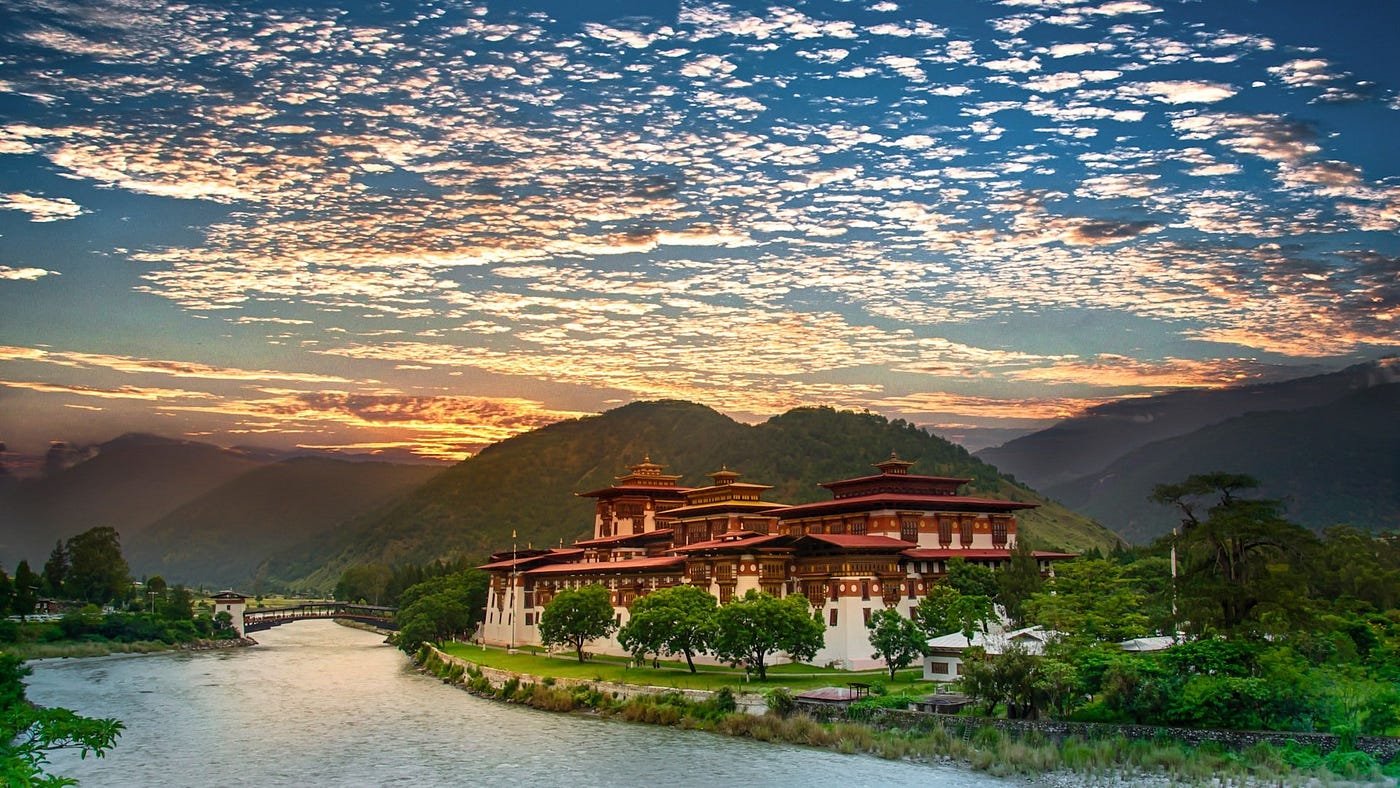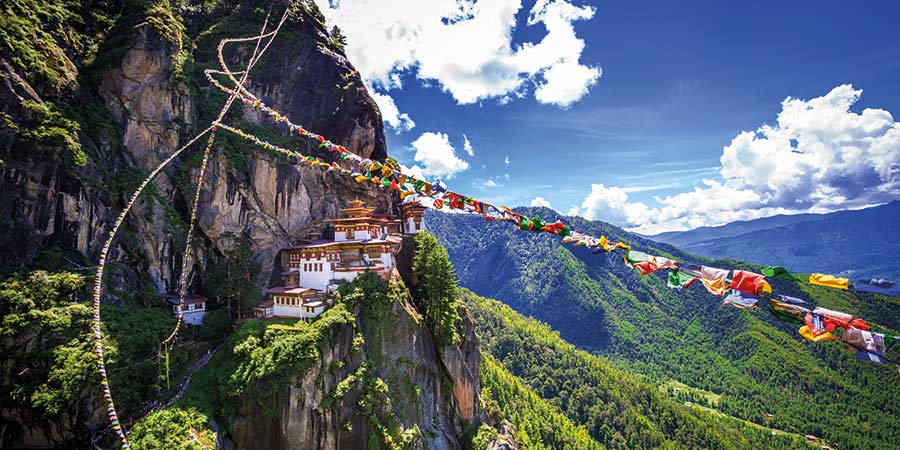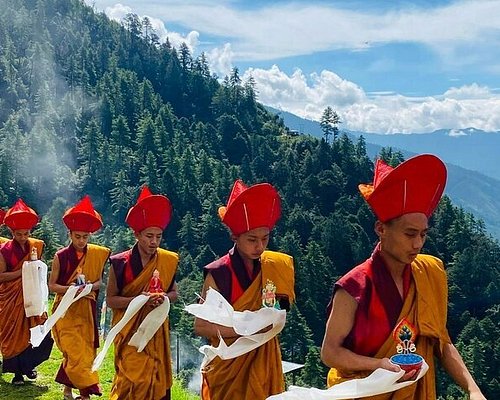The Ultimate Guide for Indian Tourists Exploring Enchanting Bhutan

Introduction to Bhutan
Overview of Bhutan
Bhutan, known as the Land of the Thunder Dragon, is a small, mystical kingdom nestled in the Eastern Himalayas. Here's a brief overview of what makes Bhutan unique:
- Unique Approach to Development: Bhutan is renowned for its Gross National Happiness Index, measuring the well-being of its citizens alongside economic factors.
- Breathtaking Landscapes: From snow-capped mountains to lush valleys, Bhutan offers a diverse array of landscapes for nature lovers and adventurers.
- Preservation of Tradition: Bhutan fiercely guards its cultural heritage, evident in everything from its architecture to its national dress.
Cultural Significance
Bhutan's cultural richness is unmatched, rooted in its ancient traditions and beliefs:
- Religion and Spirituality: Buddhism is deeply ingrained in Bhutanese life, with monasteries and stupas dotting the landscape.
- Festivals and Rituals: Vibrant festivals like the Paro Tshechu celebrate Bhutanese culture through masked dances and religious performances.
- Traditional Arts: Bhutanese art forms like thangka painting and intricate woodcarvings showcase the country's artistic prowess.
In Bhutan, culture isn't just a part of life; it is life. It permeates every aspect of society, making the kingdom a truly enchanting destination to explore.

Planning Your Trip
Visa Requirements
When planning your trip to Bhutan, one essential aspect to consider is the visa requirements. Fortunately, Bhutan has a unique visa policy aimed at promoting sustainable tourism and preserving its cultural heritage. Here are some key points to keep in mind:
- Travellers must book their trip through a licensed Bhutanese tour operator.
- The visa application process is handled by the tour operator, and a visa clearance letter is issued by the Tourism Council of Bhutan.
- Once you receive the visa clearance, you can book your flights to Paro International Airport, the only international airport in Bhutan.
- Upon arrival, your passport will be stamped with the visa, allowing you to explore this mesmerizing country.
Best Time to Visit
Choosing the best time to visit Bhutan can greatly enhance your experience. The ideal time to visit depends on your preferences and the activities you plan to engage in:
- Spring (March to May) and autumn (September to November) are popular seasons due to pleasant weather and vibrant festivals.
- If you want to witness the lush green landscapes and blooming flowers, spring is perfect.
- Autumn offers clear skies, making it ideal for trekking and enjoying panoramic views of the Himalayas.
- Winter (December to February) is the offseason but ideal for lower-altitude hikes and fewer crowds.
- Monsoon season (June to August) brings lush landscapes but also occasional rainfall, affecting road conditions in some areas.
Consider these factors while planning your trip to ensure a memorable and enjoyable experience in the Land of the Thunder Dragon.

Top Destinations in Bhutan
After immersing yourself in Bhutanese culture and cuisine, it's time to explore some of the top destinations that this enchanting country has to offer. From spiritual landmarks to bustling urban centres, Bhutan has something for every traveller.
Paro Taktsang (Tiger's Nest)
One cannot speak of Bhutan without mentioning Paro Taktsang, commonly known as Tiger's Nest. This iconic monastery perched on a cliff face is not only a breathtaking sight but also holds immense spiritual significance. Here are some highlights of a visit to Paro Taktsang:
- A steep trek through lush pine forests leads you to this awe-inspiring site.
- The stunning views of the Paro Valley from the monastery are unparalleled.
- Legend has it that Guru Rinpoche flew to this location on the back of a tigress, giving rise to its name.
Thimphu, the Capital City
As the capital city of Bhutan, Thimphu offers a blend of tradition and modernity, making it a must-visit destination. Here's what you can expect when exploring Thimphu:
- Witness the juxtaposition of ancient monasteries and contemporary structures.
- Visit the Memorial Chorten to experience the peaceful ambience of this religious monument.
- Explore the vibrant local markets for a glimpse into Bhutanese daily life.
These top destinations in Bhutan promise to leave you in awe of the country's beauty and spiritual essence. From the serenity of Tiger's Nest to the vibrant streets of Thimphu, each location offers a unique and unforgettable experience.
Now that you've explored the cultural richness of Bhutan, it's time to tantalize your taste buds with authentic Bhutanese cuisine. Bhutanese food reflects the country's unique culture and traditions, with a focus on simple yet flavorful dishes. Let's delve into the world of Bhutanese gastronomy.
Traditional Dishes to Try
When in Bhutan, be sure to sample these traditional dishes that offer a true taste of the country's culinary heritage:
- Ema Datshi: A spicy dish made with chilli peppers and cheese, considered a national dish.
- Red Rice: Nutty and rich in flavour, this variety of rice is a staple in Bhutanese meals.
- Phaksha Paa: Pork cooked with spicy red chillies, a hearty and flavorful delicacy.
- Momos: Steamed dumplings filled with meat or vegetables, a popular snack in Bhutan.
Popular Local Restaurants
To savour these delectable dishes in an authentic setting, consider dining at these popular local restaurants in Bhutan:
- Babesa Village Restaurant, Thimphu: Offers a cozy ambiance and traditional Bhutanese fare.
- Sonam Trophel Restaurant, Paro: Known for its delicious Ema Datshi and friendly service.
- Champaca Café, Punakha: A charming café serving up a fusion of Bhutanese and international dishes.
Immerse yourself in the flavours of Bhutan by indulging in these traditional dishes and dining at local eateries that capture the essence of Bhutanese cuisine.
Immersing in Bhutanese Culture
Bhutan is a country rich in traditions and culture that are deeply intertwined with everyday life. By immersing yourself in Bhutanese culture, you can gain a deeper appreciation for the country and its people. Let's explore two key aspects of Bhutanese culture: festivals and celebrations and visiting monasteries.
Festivals and Celebrations
- Tshechus: These vibrant religious festivals are held in various monasteries and dzongs across Bhutan. Tshechus are not only religious events but also social gatherings where communities come together to celebrate with mask dances, traditional music, and colourful rituals.
- Losar: This is the Bhutanese New Year, celebrated in February or March with great enthusiasm. It involves traditional rituals, delicious feasts, and local performances.
- Paro Tsechu: One of the most popular festivals in Bhutan, held in Paro, featuring the unfurling of the giant thangka (religious scroll) and masked dances.
Visiting Monasteries
- Taktsang Palphug Monastery: Also known as Tiger's Nest, this iconic monastery clings to a cliffside and offers breathtaking views. It is a sacred site and a significant pilgrimage destination.
- Punakha Dzong: This majestic fortress monastery is located at the confluence of two rivers and is known for its intricate architecture and historical significance.
- Chimi Lhakhang: This fertility temple dedicated to the Divine Madman is a unique and culturally significant monastery to visit.
Immersing yourself in Bhutanese culture through festivals and monastery visits is a truly enriching experience that will leave you with lasting memories of this vibrant and spiritual country.

Outdoor Adventures in Bhutan
If you are an outdoor enthusiast seeking thrills amidst nature, Bhutan offers a haven of exciting adventures. From challenging hiking trails to diverse wildlife sanctuaries, this Himalayan kingdom is a paradise for nature lovers. Let's explore some of the best outdoor experiences Bhutan has to offer:
Hiking Trails
- Trek to the Legendary Tiger's Nest: Embark on a hike to the iconic Paro Taktsang, also known as Tiger's Nest Monastery. The steep ascent through lush forests and panoramic vistas culminates in a breathtaking view of this sacred site perched on a cliff.
- Jomolhari Trek: Experience the beauty of Jomolhari Mountain while trekking through remote villages, alpine meadows, and pristine landscapes. This multi-day trek offers a mix of cultural encounters and stunning natural scenery.
Wildlife Sanctuaries
- Jigme Dorji National Park: Explore Bhutan's largest national park, home to diverse wildlife such as takins, snow leopards, and Himalayan blue sheep. Hike through verdant forests, cascading rivers, and high mountain passes for a chance to spot these elusive creatures.
- Phobjikha Valley: Visit this serene valley, known for its conservation of the endangered black-necked cranes. Take a guided tour to observe these majestic birds in their natural habitat and immerse yourself in the tranquillity of the surroundings.
Engaging in outdoor adventures in Bhutan not only offers adrenaline-pumping experiences but also allows you to connect with the country's rich natural heritage in a profound way.

Accommodation Options in Bhutan
After a day full of exploring the beautiful landscapes and rich culture of Bhutan, a comfortable place to rest your head is essential. Bhutan offers a range of accommodation options catering to different preferences and budgets. Whether you seek luxury or a more budget-friendly stay, there is something for everyone in this enchanting country.
Luxury Resorts
When it comes to luxury accommodation in Bhutan, you can expect top-notch service and amenities amidst stunning natural surroundings. These resorts are designed to provide a lavish experience while maintaining a deep connection with Bhutanese traditions. Some of the finest luxury resorts in Bhutan offer:
- Spacious suites with traditional decor
- Private balconies overlooking the majestic Himalayas
- Spa facilities offering rejuvenating traditional Bhutanese treatments
- Gourmet dining featuring a blend of international and local cuisine
- Personalized experiences such as cultural performances and guided tours
Budget-Friendly Guesthouses
For travellers looking to experience Bhutan on a budget without compromising on comfort, budget-friendly guesthouses are an excellent choice. These guesthouses provide a more intimate and local experience, allowing you to connect with the warmth of Bhutanese hospitality. Budget-friendly accommodations often include:
- Cosy rooms with simple furnishings
- Homely meals featuring authentic Bhutanese dishes
- Opportunities to interact with local hosts and fellow travellers
- Convenient locations in bustling towns or serene villages
- Affordable rates that won't break the bank
Whether you opt for a luxurious resort or a cosy guesthouse, the accommodation options in Bhutan are sure to enhance your overall travel experience in this majestic land. Choose the one that resonates with your travel style and immerse yourself fully in the charm of Bhutan.
Souvenirs to Buy in Bhutan
After immersing yourself in Bhutanese culture and exploring the breathtaking outdoor adventures, it's time to bring a piece of this enchanting land back home with you. Bhutan offers a rich tapestry of souvenirs that reflect its vibrant heritage and traditions.
Handicrafts and Textiles
When it comes to handicrafts and textiles, Bhutan is a treasure trove of exquisite craftsmanship. Here are some must-buy items:
- Handwoven Textiles: Bhutan is famous for its intricate handwoven fabrics like the kira (female dress) and gho (male dress). These textiles often feature intricate patterns and vibrant colours, making them unique and beautiful souvenirs.
- Thangkas: These intricate Buddhist paintings on cotton or silk are not just decorative pieces but also hold deep spiritual significance. They make for a meaningful and beautiful addition to any home.
- Handmade Paper Products: Bhutanese handmade paper, known as Deh-sho, is made from the bark of the Daphne plant. It is used to create traditional Bhutanese arts and crafts like prayer flags and lampshades.
Local Artifacts
Exploring the local markets in Bhutan is a delightful experience, offering a wide array of unique artefacts to choose from. Here are some local artefacts worth considering:
- Handcrafted Woodwork: From intricately carved masks to beautiful wooden bowls, Bhutanese woodwork reflects the country's rich artistic heritage.
- Bhutanese Prayer Wheels: These cylindrical wheels inscribed with Buddhist mantras are believed to bring good luck and ward off evil spirits. They make for a spiritual and authentic souvenir.
- Traditional Bhutanese Jewelry: Adorn yourself with intricately designed silver or turquoise jewellery inspired by Bhutanese culture and beliefs. These pieces often feature symbolic motifs and are a beautiful keepsake from your Bhutanese journey.
By selecting these handicrafts and artefacts, you not only bring back a piece of Bhutan but also support local artisans and their traditional crafts.
Health and Safety Tips for Travelers
After immersing yourself in Bhutanese culture and exploring its outdoor wonders, it's crucial to prioritize your health and safety during your travels. Let's delve into some essential tips to ensure a smooth and worry-free journey.
Altitude Sickness
When travelling to Bhutan, especially if you plan to engage in hiking or trekking activities that take you to high altitudes, you may be at risk of altitude sickness due to the country's elevated terrain. Here are some tips to help prevent and manage altitude sickness:
- Stay hydrated: Drinking plenty of water helps combat the effects of high altitude.
- Acclimatize gradually: Allow your body time to adjust to the altitude by taking it easy for the first couple of days.
- Avoid alcohol and smoking: These can exacerbate altitude sickness symptoms.
- Consult a healthcare provider: If you experience severe symptoms like dizziness or shortness of breath, seek medical advice promptly. Medications like acetazolamide can help prevent altitude sickness.
Travel Insurance
One of the most crucial elements of travel preparation is obtaining comprehensive travel insurance. Here's why travel insurance is a must for your Bhutan trip:
- Medical emergencies: In the event of illness or accidents, having travel insurance ensures you receive necessary medical care without financial burden.
- Trip cancellations or interruptions: Travel insurance can protect you against unforeseen circumstances that may disrupt your trip.
- Evacuation coverage: For remote locations or emergency situations, insurance that covers evacuation expenses provides peace of mind.
By staying informed and prepared with these health and safety tips, you can enjoy your Bhutan experience to the fullest while prioritizing your well-being.
Sustainable Tourism in Bhutan
As you immerse yourself in the beauty and culture of Bhutan, it's essential to understand the country's commitment to sustainable tourism. Bhutan has long been a pioneer in prioritizing environmental conservation and promoting responsible travel practices. By being mindful of your impact as a visitor, you can contribute to the preservation of Bhutan's unique ecosystem and cultural heritage.
Environmental Conservation Efforts
In Bhutan, the government has implemented various initiatives to protect its pristine environment. Some of the key conservation efforts include:
- Forest Protection: Bhutan maintains a forest cover of over 70%, and logging is strictly regulated to preserve biodiversity.
- Wildlife Conservation: National parks and wildlife sanctuaries safeguard endangered species like snow leopards, red pandas, and black-necked cranes.
- Carbon Neutral Policy: Bhutan is committed to remaining carbon neutral, emphasizing sustainable development and eco-friendly practices.
Responsible Travel Practices
When exploring Bhutan, you can actively participate in sustainable tourism by adopting responsible travel practices, such as:
- Respecting Local Customs: Embrace the local customs and traditions to show appreciation for Bhutanese culture.
- Minimizing Waste: Reduce plastic waste by carrying a refillable water bottle and reusable shopping bags.
- Supporting Local Communities: Opt for homestays or locally-owned accommodations to contribute directly to the community.
By aligning your travel choices with Bhutan's conservation efforts, you not only experience the country authentically but also leave a positive impact on its environment and people.
